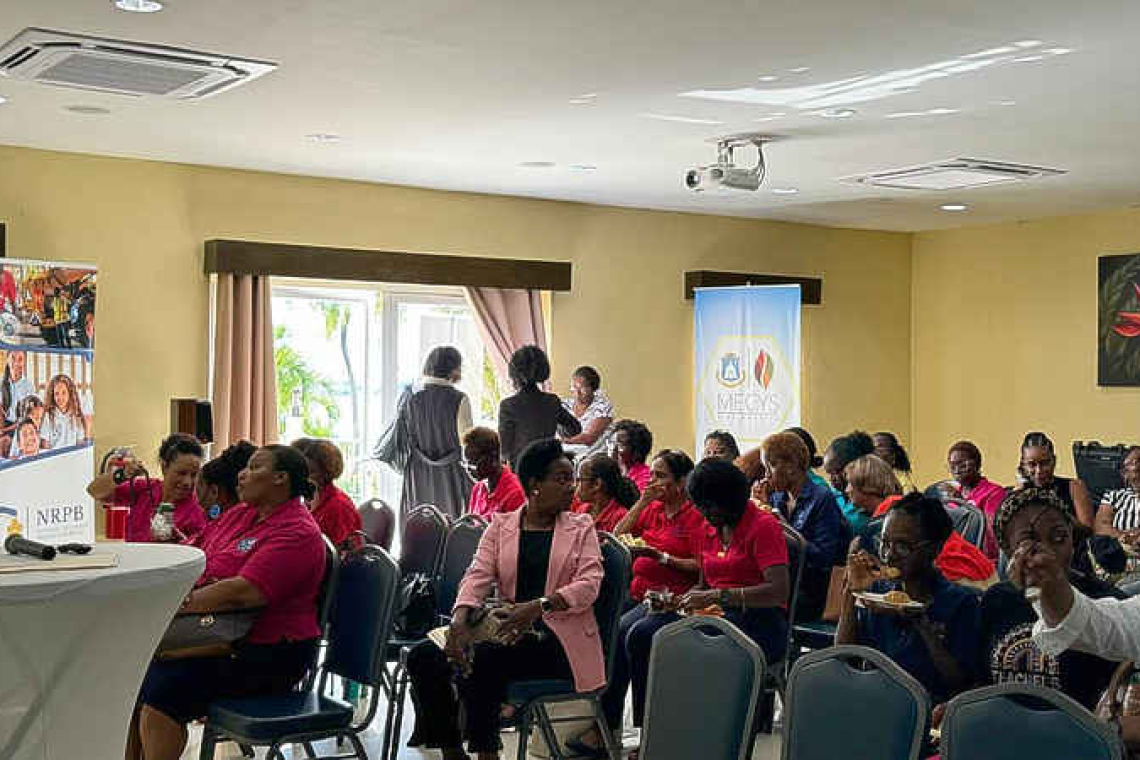EGRA/EGMA results presentation, September 12, at Simpson Bay Resort.
PHILIPSBURG--The National Recovery Program Bureau (NRPB) recently presented the results of assessments of primary school students to stakeholders as part of ongoing educational consultations.
The Early Grade Reading Assessment (EGRA) and Early Grade Mathematics Assessment (EGMA) conducted over the past year, have given the Government of St. Maarten insight into pupils’ reading and maths skills across the island. These consultations are part of the Trust Fund’s Fostering Resilient Learning Project (FRLP), which aims to help restore and strengthen the island’s education system following the damage caused by Hurricane Irma and disruptions from the COVID-19 pandemic.
The project is implemented by the NRPB on behalf of the Government of St. Maarten, in collaboration with the Ministry of Education, Culture, Youth and Sport (MECYS). While the FRLP mainly focuses on repairing the Charles Leopold Bell School, Sister Marie Laurence School and the Sint Maarten Jubilee Library, the assessments offer further opportunities to improve literacy and numeracy for children in these restored learning environments.
ECYS Minister Lyndon Lewis stated that the government is committed to using the data from the assessments to shape the future of early education in Sint Maarten: “The EGMA and EGRA assessments provide us with an invaluable snapshot of where our students are today and where we need to focus our efforts. With this data, we are better equipped to tailor our education strategies to meet the needs of every child in Sint Maarten. By investing in teacher training, enhancing the curriculum and supporting students at home and in the classroom, we are committed to ensuring that every child has the tools they need to thrive academically and in life.”
Group three (Grade one) pupils typically aged seven to eight from 17 primary schools across St. Maarten made up the study. The assessments tested children’s proficiency in Maths, Reading, Comprehension and Dutch. EGMA tests focused on skills like number identification, addition, subtraction and problem-solving. EGRA assessments evaluated letter and word recognition, reading comprehension and understanding of phonemes. Results were categorized into three levels: mastery, developing and emerging. Students at the mastery level demonstrated a strong understanding of concepts and skills and showed they were ready for advanced challenges. The developing group had some knowledge but needed support to reach mastery, while students in the emerging category were in the early stages of acquiring the necessary skills for their grade level and would benefit from reteaching and practice.
The assessments indicated that many students were below the mastery benchmarks, instead falling into the developing and emerging categories. For example, only 6% of pupils achieved mastery in oral reading fluency; the benchmark is 50+%, while 11% reached mastery in numeracy based on their addition speed; the benchmark is 56+%. However, data varied by school, with some schools reporting more than 80% of pupils had mastery in literacy whilst other schools had scores as low as 36%. The report also showed that student performance was affected by teaching methods and support at home.
Teachers who used a mix of teaching styles, explained lesson goals clearly and reviewed lessons often saw better results. More than half the students said they had little or no help with homework and family income also played a role in learning outcomes. Additionally, the assessments found close to three-quarters of students used tablets, suggesting that technology could be a tool to improve learning.
Sidonia Lacorbiniere-Hodge, ECYS Department Head of Education stated, “This marks a significant milestone for MECYS in assessing student learning within the Primary Education Cycle. This assessment provides valuable insights for school boards, school management and education staff into student performance in Group three in 2023, particularly for this group of students whose education was disrupted by the COVID-19 Pandemic. We look forward to continued collaboration with all partners in utilizing standardized assessment results to inform strategies to meet each student’s developmental needs.”
This long-term commitment to enhancing literacy and numeracy aligns with St. Maarten’s broader educational objectives. Through assessments like EGMA and EGRA, the government aims for the country’s education system to meet the needs of students from an early age. This will ensure they have the foundation needed to succeed academically and beyond. The NRPB is implementing the FRLP project on behalf of the Government of Sint Maarten under the Sint Maarten Trust Fund, which is managed by The World Bank and financed by the Dutch Government.







